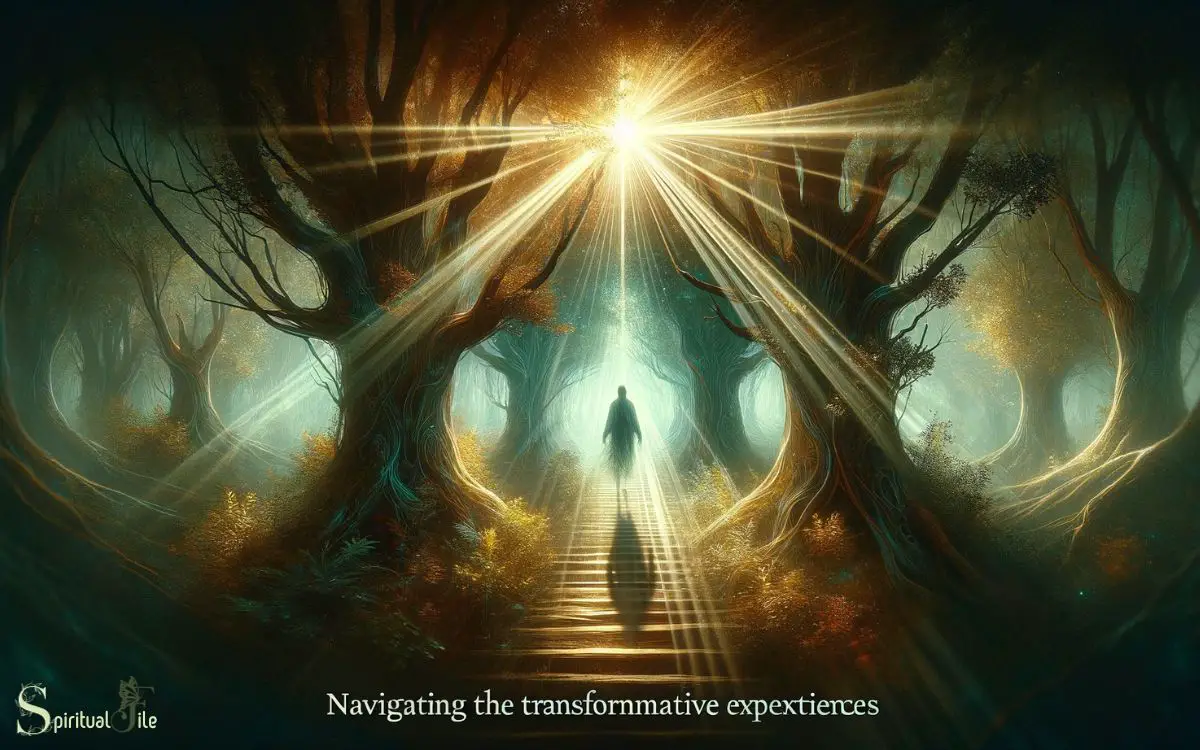Spiritual Experience Vs Spiritual Awakening: Perspective!
A spiritual experience can be seen as a temporary event that gives an individual a glimpse into a profound state of consciousness or a feeling of oneness with the universe. It can occur spontaneously or be induced by various practices or situations.
In contrast, a spiritual awakening is a more enduring transformation that involves a fundamental change in one’s identity, perspective, and understanding of life. It often leads to a sustained shift in consciousness and a reorientation of one’s values and behavior.
Spiritual experiences and awakenings are milestones in personal development, yet they differ significantly:
Spiritual Experience:
- Often brief and intense
- May involve mystical insights or feelings of bliss
- Can act as a catalyst for growth
- Not necessarily accompanied by lasting change
Spiritual Awakening:
- Usually a long-term process
- Involves deep insights into the nature of reality
- Leads to permanent shifts in perception
- Often results in a new way of living and being
For example, a person might have a spiritual experience during meditation, feeling an intense connection with everything.
This could, over time, lead to a spiritual awakening, where they consistently perceive life with greater compassion and understanding.
Embarking on a spiritual path can illuminate the contrasts between fleeting moments of divine connection and the profound, lasting transformation of awakening. Both are vital in the quest for deeper self-realization and harmony.

Key Takeaway
Comparison of spiritual experience and spiritual awakening.
| Spiritual Experience | Spiritual Awakening |
|---|---|
| Temporary states | Permanent shift |
| Glimpses | Fundamental change |
| Moments of bliss | New way of being |
Defining Spiritual Experience

The term ‘spiritual experience’ encompasses a wide range of personal encounters with the divine or transcendent, often characterized by a profound sense of connection or revelation.
These experiences can be deeply transformative, leading individuals to question the nature of reality, their place in the world, and their relationship to the divine.
Spiritual experiences can take many forms, including moments of deep meditation, encounters with nature, or sudden realizations of universal truths.
They are often marked by a sense of awe, interconnectedness, and a feeling of being part of something greater than oneself.
While spiritual experiences are deeply personal and subjective, they often share common themes of transcendence, interconnectedness, and a deep sense of meaning and purpose in the universe.
Characteristics of Spiritual Awakening

Characterizing spiritual awakening involves recognizing profound shifts in consciousness and perception, often leading to a heightened awareness of interconnectedness and a deep sense of purpose in one’s existence.
Individuals undergoing spiritual awakening often experience a fundamental shift in their understanding of reality, transcending the limitations of the ego and material concerns.
This shift can result in a deep sense of compassion and empathy, with an increased focus on the well-being of others and the world at large.
Moreover, spiritual awakening is often accompanied by a sense of inner peace and contentment, irrespective of external circumstances. Another key characteristic is the heightened intuition and a greater connection to one’s inner wisdom.
This awakening process can lead individuals towards a more authentic and meaningful way of living, fostering a sense of harmony and alignment with the universe.
Understanding the Impact

Understanding the impact of spiritual awakening involves exploring the profound personal transformation that occurs through spirituality.
It also entails recognizing the subtle yet powerful inner shifts that take place as one undergoes a spiritual awakening.
This discussion will shed light on the significant impact of spiritual awakening on an individual’s life and consciousness.
Personal Transformation Through Spirituality
Personal transformation through spirituality has a profound impact on individuals’ lives. It brings about a shift in perspective and behavior, leading to significant changes in various aspects of life.
The impact of personal transformation through spirituality includes:
- Emotional Resilience: Spirituality fosters emotional resilience, helping individuals cope with stress and adversity more effectively.
- Enhanced Empathy: It cultivates a greater sense of empathy and compassion towards others, fostering healthier relationships and a deeper sense of connection.
- Increased Clarity and Purpose: It provides individuals with a clearer sense of purpose and direction, guiding their actions and decisions towards a more fulfilling life.
- Improved Well-Being: Spirituality often leads to improved overall well-being, encompassing mental, emotional, and physical health, leading to a more balanced and harmonious life.
Recognizing Inner Spiritual Shifts
The impact of personal transformation through spirituality, as discussed in the previous subtopic, lays the groundwork for recognizing inner spiritual shifts and understanding their profound impact on individuals’ lives.
Inner spiritual shifts often manifest as a heightened sense of self-awareness, a deeper connection to the world, and a shift in perspective towards life’s challenges.
Recognizing these shifts is crucial as they can lead to a more profound understanding of one’s purpose and a greater sense of fulfillment.
Individuals may experience a shift in values, priorities, and relationships, leading to positive changes in their behavior and decision-making.
Understanding the impact of these shifts allows individuals to navigate their spiritual journey more consciously, fostering personal growth and a deeper connection to the world around them.
Navigating the Transformative Effects

As individuals navigate the transformative effects of spiritual experiences and awakenings, it is essential to understand the personal growth process involved. This entails recognizing the internal shifts and changes that occur within oneself.
Understanding Personal Growth Process
Navigating the transformative effects of personal growth process involves understanding the shifts in one’s spiritual awareness and consciousness.
This understanding is crucial for individuals who seek personal development and spiritual evolution.
To effectively navigate the transformative effects of personal growth, one must:
- Self-Reflection: Engage in introspective practices to gain insight into one’s beliefs, values, and behaviors, fostering self-awareness and understanding.
- Mindfulness Practices: Incorporate mindfulness meditation and other contemplative practices to cultivate present-moment awareness and develop a deeper connection with one’s inner self.
- Seeking Knowledge: Pursue spiritual and personal development literature, teachings, and mentorship to expand one’s understanding of the growth process and gain wisdom from various sources.
- Embracing Change: Embrace the inevitable changes that come with personal growth, and develop resilience to navigate the challenges and opportunities that arise during the transformative journey.
Recognizing Internal Shifts
Recognizing internal shifts during the transformative process of personal growth involves acknowledging and embracing the evolving nature of one’s spiritual awareness and consciousness.
As individuals progress through their spiritual awakening, they often experience profound internal changes that impact their perspectives, beliefs, and interactions with the world.
Navigating these transformative effects requires self-awareness and a willingness to adapt to the evolving landscape of one’s spiritual journey. It’s vital to recognize and understand these internal shifts to fully embrace the process of spiritual awakening.
| Internal Shifts | Description | Navigating Strategies |
|---|---|---|
| Shift in beliefs | Fundamental changes in core beliefs | Openness to new perspectives |
| Expanded empathy | Heightened sensitivity and compassion | Practicing empathy daily |
| Enhanced intuition | Increased trust in inner guidance | Meditation and mindfulness |
Embracing the Journey
Embracing the spiritual journey requires consistent reflection and introspection.
To fully engage with this process, individuals can consider the following:
- Mindfulness Practices: Incorporating meditation, yoga, or other mindfulness techniques can help individuals stay present and cultivate self-awareness.
- Seeking Guidance: Engaging with spiritual teachers, mentors, or community support can offer valuable insights and encouragement along the path.
- Exploring Wisdom Traditions: Studying various spiritual and philosophical traditions can provide diverse perspectives and enrich one’s understanding of the spiritual journey.
- Cultivating Gratitude: Practicing gratitude can foster a positive mindset and deepen one’s connection to the spiritual experience.
These actions can aid in navigating the spiritual journey with openness and receptivity, ultimately leading to greater self-discovery and growth.
Transitioning into the subsequent section about ‘integrating spiritual realizations’ necessitates a willingness to embrace change and transformation.
Integrating Spiritual Realizations

Upon reaching spiritual realizations, individuals must focus on integrating these insights into their daily lives for personal growth and transformation.
This integration involves aligning one’s actions and decisions with the newfound understanding, thereby living in accordance with the spiritual insights gained.
It requires mindfulness and conscious effort to apply these realizations to every aspect of life, including relationships, work, and personal development.
Integrating spiritual realizations also involves letting go of old patterns and beliefs that no longer serve the individual’s higher purpose, and embracing new ways of being and relating to the world.
This process can be challenging, yet it is essential for deepening spiritual awakening and experiencing lasting change.
Cultivating mindfulness and presence is a key aspect of this integration, as it allows individuals to remain connected to their spiritual insights in their daily experiences.
Cultivating Mindfulness and Presence

The cultivation of mindfulness and presence plays a crucial role in integrating spiritual realizations into one’s daily life and deepening the process of spiritual awakening.
To effectively cultivate mindfulness and presence, individuals can:
- Engage in regular meditation practices to quiet the mind and develop a heightened awareness of the present moment.
- Practice conscious breathing exercises to anchor oneself in the present and foster a sense of inner calm and centeredness.
- Engage in activities such as yoga or tai chi, which promote physical mindfulness and encourage a deeper connection between the mind and body.
- Cultivate a habit of mindful observation, where one consciously pays attention to their thoughts, emotions, and surroundings without judgment, allowing for a greater sense of presence in everyday experiences.
Harnessing the Power of Both Experiences

To fully harness the power of both spiritual experience and spiritual awakening, individuals must actively integrate these insights into their daily lives through intentional practice and self-reflection.
By incorporating the lessons learned from spiritual experiences and the awakening process, individuals can create a transformative and sustainable spiritual practice.
Here’s a table summarizing key aspects of harnessing the power of both experiences:
| Spiritual Experience | Spiritual Awakening |
|---|---|
| Moments of connection, insight, and transcendence | Shift in consciousness, leading to a new perspective on life |
| Often spontaneous and fleeting | Can be a gradual or sudden realization |
| Provides glimpses of higher truths | Results in a deep understanding of one’s true nature |
| Can inspire and motivate | Leads to lasting inner peace and contentment |
Integrating these aspects into daily life through mindfulness, gratitude, and compassion can lead to a more fulfilling and purposeful existence.
Spiritual Awakening Vs Spiritual Experience Aa

Certainly, here are shorter explanations of “spiritual awakening” and “spiritual experience” in the context of Alcoholics Anonymous (AA):
- Spiritual Awakening in AA: A profound shift in perspective and character that occurs during the process of working AA’s 12 Steps, helping individuals recover from alcoholism.
- Spiritual Experience in AA: A personal, subjective moment of insight or connection to a higher power that reinforces one’s commitment to sobriety and spiritual growth in AA’s program.
– What is the difference between a spiritual dream and a spiritual vision in terms of achieving a spiritual awakening or experience?
A spiritual dream and vision both hold significance in achieving a spiritual awakening. While a spiritual dream occurs during sleep, a spiritual vision happens during wakefulness. Both can provide insight and guidance on one’s spiritual path, leading to a profound awakening or experience.
FAQ About Spiritual Experience Vs Spiritual Awakening
Can Spiritual Experiences and Spiritual Awakenings Occur Simultaneously or Is One Typically a Precursor to the Other?
Spiritual experiences and spiritual awakenings can occur simultaneously in some cases, while in others, one may precede the other.
Both are profound and deeply personal events that can lead to spiritual growth and transformation.
How Can One Distinguish Between a Temporary Spiritual Experience and a Lasting Spiritual Awakening?
Distinguishing a temporary spiritual experience from a lasting spiritual awakening involves evaluating the depth of transformation, lasting impact, and integration into daily life.
This process requires introspection, self-awareness, and guidance from spiritual mentors or counselors.
Are There Specific Practices or Techniques That Can Help Individuals Navigate the Transformative Effects of Spiritual Awakening?
Navigating the transformative effects of spiritual awakening can be supported by various practices and techniques.
These may include mindfulness meditation, grounding exercises, journaling, seeking guidance from spiritual leaders, and engaging in self-reflection and introspection.
What Are Some Common Challenges That People Face When Integrating Spiritual Realizations Into Their Everyday Lives?
Integrating spiritual realizations into everyday life can pose challenges.
Common obstacles include reconciling newfound perspectives with existing beliefs, navigating societal expectations, and maintaining a sense of balance and grounding amidst spiritual growth.
Can Harnessing the Power of Both Spiritual Experiences and Spiritual Awakenings Lead to a Deeper Sense of Fulfillment and Purpose?
Harnessing the power of both spiritual experiences and spiritual awakenings can lead to a deeper sense of fulfillment and purpose.
By integrating these experiences, individuals can gain a greater understanding of themselves and their place in the world.
Conclusion
The contrast between spiritual experience and spiritual awakening reveals the depth and breadth of the human spiritual journey.
Like a seed sprouting into a vibrant, blossoming flower, spiritual experiences and awakenings both contribute to the growth and flourishing of the individual soul.
Each experience has its own unique power and significance, adding layers of richness and meaning to the tapestry of spiritual life. Together, they create a harmonious symphony of spiritual evolution and enlightenment.






